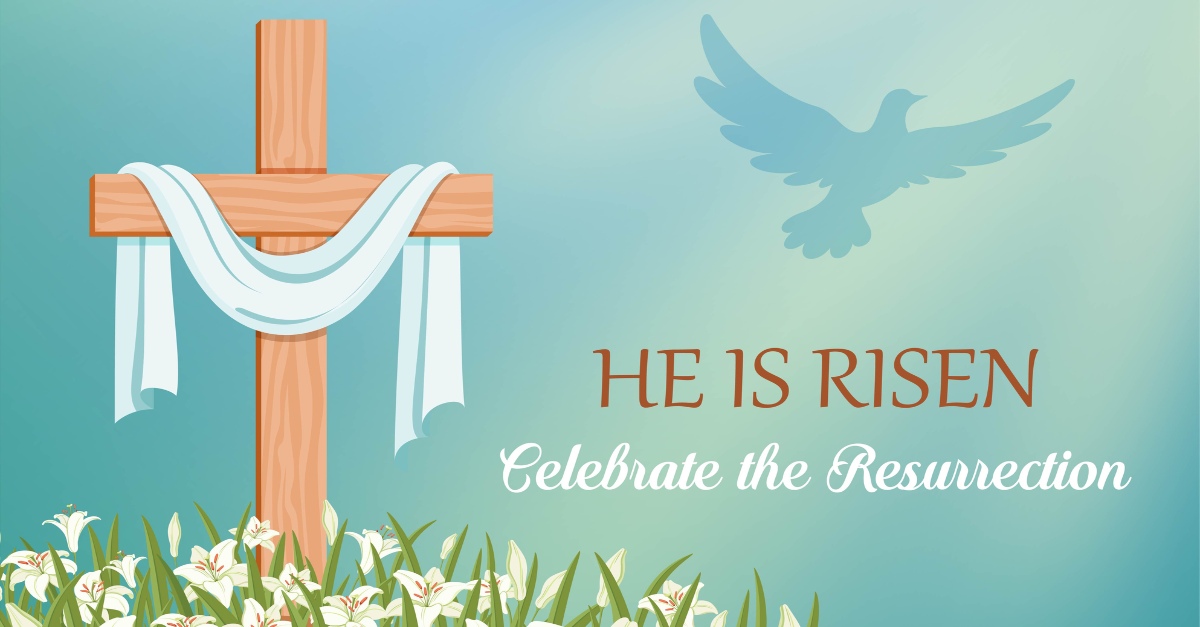After Old Testament Readings; 1st Reading: Rom 6:3-11; Psalm: 118. R. v. Alleluia; Gospel: Lk 24:1-12
HE IS RISEN: SEEK NOT LIFE AMONG THE DEAD
BY VALENTINE NNAMDI EGBUONU, MSP

Easter is here. We began the journey to this season when at Lent we observed a 40 day fasting, prayer and almsgiving. This practice symbolically represents the Israelites 40 years of wandering in the wilderness due to their sins. It also represents Christ’s 40 days of fasting and prayer in the wilderness before his public ministry. These two biblical references point to how we have wondered away in sin and how Christ illustrated the means to war against sin and temptation. These Lenten 40 days of warring against sin officially ended on Holy Thursday the beginning of the Paschal Triduum.
From Holy Thursday to Holy Saturday (the Easter Vigil), we celebrate the Lord’s Paschal Mystery: his life, death and resurrection. It is worthy of note that although these celebrations are done on three separate days, they are however one and undivided. What we began on Holy Thursday is not completed until Easter vigil. This explains why the Holy Thursday mass begins with greetings (May the grace of our Lord Jesus Christ, the love of God . . .) and ends without a final blessing. On Good Friday, the Lord’s passion celebration would begin without any greeting and also ends without a final blessing. On Holy Saturday, there is also no greeting at the beginning of the mass but a final blessing is given at the end of the mass with the alleluia chant. So, the Easter Triduum has this character of unity which is why it is important not to miss out on any of them in order not to disrupt the character and progression of these celebrations.
The Easter Triduum is a salvific event that marks the redemption of all the people of God including all those who died before Christ. This is what we celebrate tonight. This celebration which marks our liberation from the darkness of sin to the bright light of salvation is symbolised by the Paschal Candle (representing Christ) which the minister carries in procession into the church where all lights are extinguished.
The “Paschal Candle” originates from the Hebrew word “Pasch” meaning “Passover.” Recall the Passover meal of the Israelites on the eve of their departure from Egypt which subsequently kick-started their movement from that land of suffering (which they deserved due to their sins) to the Promised Land of Canaan flowing with milk and honey. The carrying of the Paschal Candle on Easter vigil therefore re-enacts how Christ led all God’s people from sin to salvation. And the reception of the Eucharistic meal at this Mass will further strengthen us on our faith’s journey to the heavenly home land.
The readings at this mass which started from the Old Testament and culminated in the New Testament resonates that the salvation wrought by Christ covers from the beginning of creation. The emphasis on the ‘no omission’ whatsoever of the third reading of tonight is because of its symbolic meaning to the character of tonight’s celebration. This is because the passing of the Israelites through the Red Sea foreshadowed the washing away of sins through baptismal water. In the eighth reading of today taken from the New Testament, St Paul will highlight that we were all baptised into Christ by his death and buried with him by baptism into his death. And that as Christ was raised from the dead by the Father, we too might walk in newness of life with him (Rom 6:3-4). The resurrection of Christ therefore means our rebirth to newness of life and salvation.
As we celebrate our salvation in the resurrection of Christ, we may be tempted to think that this event is a mere remembrance of what happened thousands of years ago. This is not so. For by Christ’s death and resurrection we have become one with Christ. A spiritual bond that cannot be broken. Christ is the head of the body the Church (Col 1:18). We are the members of this body through baptism (1Cor 12:13). And if this is so, then when we celebrate Easter of which Christ is the Principal celebrant, it is a live event since we are in communion with Christ. We can now begin to understand what would have become of us if Christ had not risen from the dead. There will be no faith, no church, and no baptism.
In the gospel of tonight, the angels said to the women “Why do you seek life among the dead? He is not here but has risen” (Lk 24:5). This question also applies to us very strongly. “Why do we seek life among mortality, mundane things; things that wouldn’t last?” Life does not subsist in fleeting realities. We should rise from this mentality. Christ should be the life we seek because we have been bonded with him and in him life subsists. As Easter people, we should always remember what we have become: one body with Christ. This should guide our actions and choices knowing that we no longer belong to the world.
“I appeal to you therefore, brethren, by the mercies of God, to present your bodies as a living sacrifice, holy and acceptable to God, which is your spiritual worship. Do not be conformed to this world but be transformed by the renewal of your mind, that you may prove what is the will of God, what is good and acceptable and perfect.” (Rom 12:1-2).
PRAYER FOR THE DAY
Risen Lord, help us to cherish the new life of Easter by a holy way of life. Amen.
Happy Easter!



May His will be perfected in me. Amen to your prayers Padre